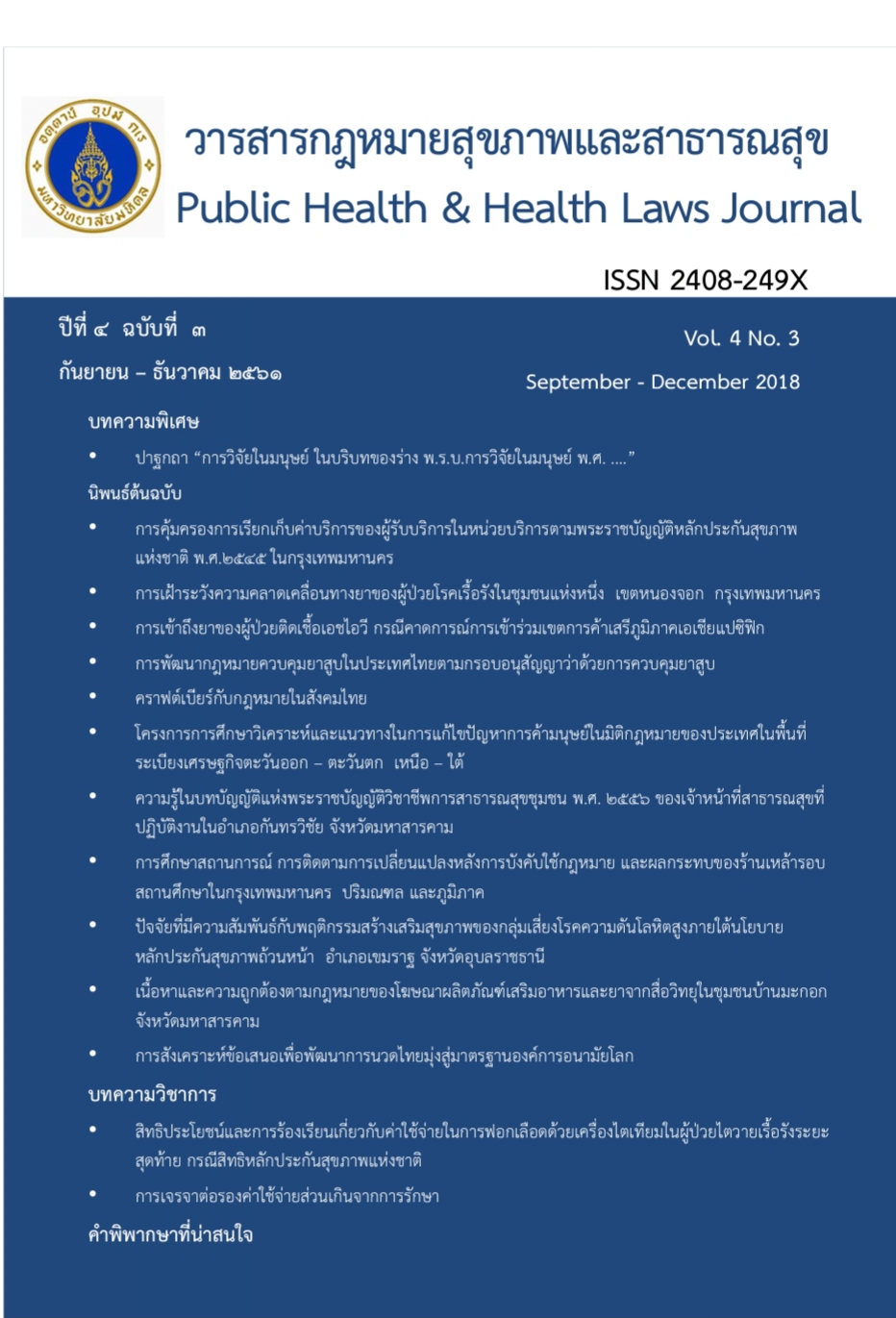The project on the legal study and analysis of human trafficking in the countries on the East-West and North –South economic corridor
Keywords:
human trafficking/ North-South, East-West Economic Corridor/ Problem of Enforcement on Human trafficking caseAbstract
Abstract
The research aims to study and analyze the human trafficking problem. Studying the laws and regulations of various countries in the East-West, North-South Economic Corridor to know the existing laws of the studied countries, what are the substantive and procedural laws of each country? How to enforce the laws, and what are the problems of law enforcement in practice of these countries? The study in this research was carried out at the level of domestic law and international law, studying the treaties on the prevention and suppression of human trafficking at the international and regional level. The fundamental causes of human trafficking are the social, economic and political problems, particularly the lack of the effective law enforcement. The results of the study showed that the legal issues of each country have some common characteristics. They are the problems of the Interpretation, scope of definition of "Human Trafficking" because in different societies may have different traits of human trafficking. Lawsuit against the perpetrator, the problem of the separation of victims from being an offender, protection of witness, lack of expertise of the staffs, law enforcement agency may be overlapping, or in some circumstances there is a vacuum to enforce the laws, and corruption of related officers. To solve the problems, at the regional level, there is no treaty or regional code on the prevention and suppression of human trafficking. There are no regional standards for assessing law enforcement at the ASEAN level. Internationally level, there are problems of enforcing the treaty or the lack of efficient application of the obligation under the treaty. Most of them are just lip-services, the parties to the treaty make no concrete regulatory action and action plan for implementation of the law. The assessment of the suppression of human trafficking has also influenced by the political involvement. For solutions at the national level, the Codification of the Prevention and Suppression of Human Trafficking by combining the substantive laws and procedural law in the same code will be needed, it will be divided into the part of substantive law and the other part dealing with the procedural law to be more appropriate to the specific nature of the human trafficking case. Training the related staffs of the competent authority, providing sufficient budget, protection of Victims and Witnesses. At the regional level, there should be a treaty on cooperation in prevention and suppression of human trafficking. It should also set the ASEAN standard for performance appraisal, establish clear legal framework and definition of scope for human trafficking.
References
คณะกรรมาธิการการพัฒนาสังคมและกิจการเด็ก เยาวชน สตรี ผู้สูงอายุ คนพิการ และผู้ด้อยโอกาส. รายงานการพิจารณาศึกษา ผลการดำเนินงานตามพระราชบัญญัติป้องกันและปราบปรามการค้ามนุษย์ พ.ศ. 2551. กรุงเทพฯ : สำนักการพิมพ์ สานักงานเลขาธิการวุฒิสภา
รายงานผลการดำเนินงานป้องกันและปราบปรามการค้ามนุษย์ของประเทศไทย ประจำปี 2557. (2557). สำนักงานเลขานุการคณะกรรมการป้องกันและปราบปรามการค้ามนุษย์ กระทรวงการพัฒนาสังคมและความมั่นคงของมนุษย์
ประธาน วัฒนวาณิชย์ และเศรษฐชัย อันสมศรี. (2548). การป้องกันองค์กรอาชญากรรมข้ามชาติภายใต้กรอบอนุสัญญาสหประชาชาติว่าด้วยการต่อต้านอาชญากรรมข้ามชาติที่จัดตั้งในลักษณะองค์กร ค.ศ. 2000 ข้อ 31 : รายงานวิจัยฉบับสมบูรณ์. กรุงเทพมหานคร : สานักงานกองทุนสนับสนุนการวิจัย
ประธาน วัฒนวาณิชย์, ปิติกาญจน์ สิทธิเดช, วีระศักดิ์ แสงสารพันธ์ และคณะ. (2547). มาตรการป้องกันและปราบปรามองค์กรอาชญากรรมและผู้มีอิทธิพล : ในมาตรการปูองกันและปราบปรามองค์กรอาชญากรรมและผู้มีอิทธิพล, รายงานการวิจัยเพื่อนาเสนอในการประชุมทางวิชาการระดับชาติ ว่าด้วยงานยุติธรรมครั้งที่ 2 ณ ศูนย์การประชุมอิมแพ็ค เมืองทองธานี, (6-7กันยายน 2547) กรุงเทพฯ : สำนักงานยุติธรรม
วีระพงษ์ บุญโญภาส และคณะ. (2548). การกำหนดความผิดฐานฟอกเงินที่ผู้กระทำเป็นองค์กรอาชญากรรมข้ามชาติและมาตรการ รวมทั้งความร่วมมือระหว่างประเทศในการปราบปรามการฟอกเงินและมาตรการยึด อายัดและริบทรัพย์สิน . รายงานวิจัยฉบับสมบูรณ์ เรื่อง การพัฒนากฎหมายป้องกันและปราบปรามองค์กรอาชญากรรมข้ามชาติ (ระยะที่ 2) . กรุงเทพฯ: สถาบันกฎหมายอาญา สำนักงานอัยการสูงสุด
United Nations Office on Drugs and Crime. (2014). GLOBAL REPORT ON TRAFFICKING IN PERSONS. United Nations New York: UNITED NATIONS PUBLICATION
United Nations Office on Drugs and Crime. (2012). GLOBAL REPORT ON TRAFFICKING IN PERSONS. United Nations New York: UNITED NATIONS PUBLICATION
Roth. M.P. (2012). Global organized crime: A reference handbook. California: ABC
Downloads
Published
How to Cite
Issue
Section
License
Disclaimer and Copyright Notice
The content and information presented in articles published in the Journal of Law and Public Health Policy represent the opinions and sole responsibility of the respective authors. The editorial board does not necessarily agree with or assume any responsibility for the views expressed.
All articles, data, content, images, and other materials published in the Journal of Law and Public Health Policy are the intellectual property of the journal. Any individual or organization wishing to reproduce, distribute, or otherwise use the entirety or any part of such materials must provide proper citation.





